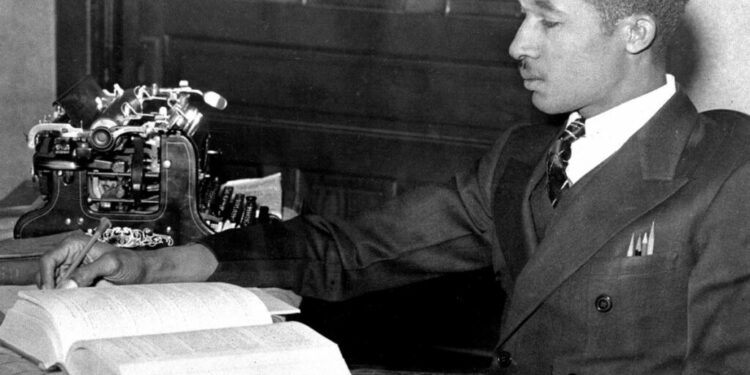Imagine being a 28-year-old Black man in the United States of America during the 1930s aspiring to attend law school, only to receive a rejection letter, not due to a lack of qualifications or financial support, but solely because of your race.
Imagine recording in your journal the determination to become the first Black graduate of an all-White law school, unaware that your courageous fight for justice would conclude not with your own matriculation, but with the doors of the University of Missouri School of Law opening for generations of Black students who followed in your stead.
As Black History Month (celebrated mainly in the US) draws to a close, I reflect on Gaines’ legacy as a profound lesson for our nation’s youth. The pursuit of justice and equality often demands sacrifice, and history teaches us that those who set out to break barriers may not always live to walk through the doors they open, yet their struggle is not in vain. Sometimes, the greatest impact lies not in achieving personal triumph but in cracking the glass ceiling — creating the first fractures that will eventually shatter the structures of systemic injustice.
History often remembers its victors, but it sometimes forgets the pioneers who paved the way for them. Among these overlooked figures is Lloyd Lionel Gaines, a young man whose fight for educational equality in the United States was instrumental in the early civil rights movement. His legal battle, Gaines v Canada (305 US 337, 1938), forced the US Supreme Court to take a stand against segregation in higher education, laying the groundwork for Brown v Board of Education (1954). Yet Gaines’ fate remains a mystery, his story one of both triumph and tragedy.
The Case That Changed America
Gaines was born in 1911 in Mississippi, but grew up in Missouri. He was an exceptional student, graduating with honours from Lincoln University, a historically Black college. Eager to pursue a law degree, he applied to University of Missouri’s School of Law in 1935. His application, however, was denied solely because he was Black. Missouri’s laws required segregated schooling, and the state offered to pay for Gaines to attend an out-of-state law school rather than integrate its own.
Gaines, backed by the National Association for the Advancement of Colored People (NAACP) and led by the brilliant attorney Charles Hamilton Houston, challenged this practice. The case, Gaines v Canada, reached the US Supreme Court, which ruled in his favour in 1938. The court decided that Missouri had to provide Gaines with an equal legal education within its borders rather than send him elsewhere.
This was a landmark moment in American jurisprudence. It didn’t end segregation, but it set a crucial precedent: States could no longer shirk their responsibility to provide equal opportunities under the law.
A Mystery That Haunts the Movement
Despite his legal victory, Gaines never had the chance to attend law school. In March 1939 he vanished under mysterious circumstances, never to be seen again. Some speculate that he was a victim of racist violence, while others believe he simply walked away from his battle, exhausted by the pressures he faced. The truth remains unknown, but his disappearance robbed the civil rights movement of a brave young leader.
Gaines’ Legacy and the Path Forward
Although Gaines’ personal story ended in uncertainty, his legal battle reshaped American education and civil rights law. His case forced states to confront their segregated institutions and laid the legal foundation for future victories, including the end of legal segregation in Brown v Board of Education. The principles established in Gaines v Canada would later help dismantle the very system that sought to exclude him.
As a Jamaican youth leader and activist, I see Gaines’ struggle as a reminder that progress is often built on the backs of those who fight, even when they do not live to see the fruits of their labour. In our own Caribbean context, we, too, face structural inequalities that demand relentless advocacy. Whether it is in education, politics, or social justice, we must continue to challenge unfair systems, just as Gaines did.
In remembering him, we honour not just the man but the movement he helped ignite. We owe it to him and to ourselves to keep pushing for a more just and equal world.
Source link : http://www.bing.com/news/apiclick.aspx?ref=FexRss&aid=&tid=67b80c524c844e2dbd23ba19325fc981&url=https%3A%2F%2Fwww.jamaicaobserver.com%2F2025%2F02%2F21%2Flaw-student-america-feared%2F&c=1040475376834433903&mkt=en-us
Author :
Publish date : 2025-02-20 10:59:00
Copyright for syndicated content belongs to the linked Source.









